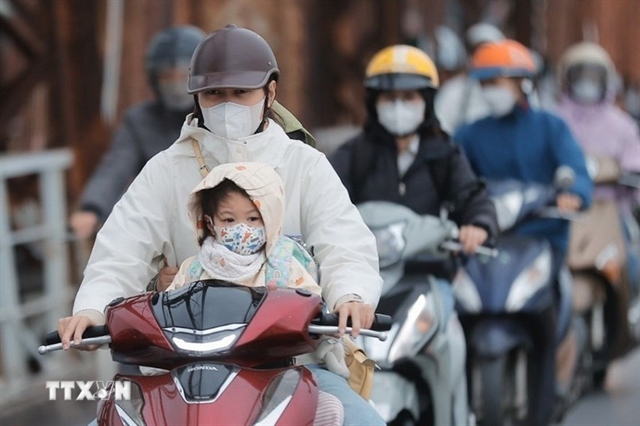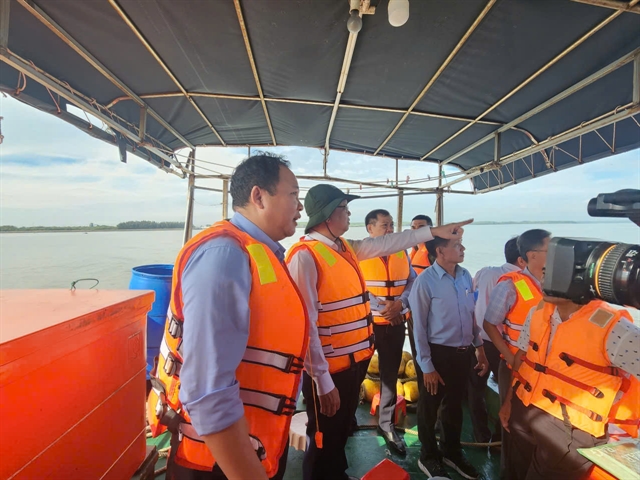 Society
Society

 |
| Vice chairman of the HCM City People’s Committee, Bùi Minh Thạnh, inspects fishing vessels operating in waters off Cần Giờ. Photo sggp.org.vn |
HCM CITY – As Việt Nam enters a crucial phase in its efforts to lift the European Commission’s “yellow card” warning on illegal, unreported and unregulated fishing, HCM City is strengthening its oversight of offshore fishing with closer supervision and more severe penalties for violations.
Bùi Minh Thạnh, vice chairman of the city People’s Committee, said there must be no negligence, complacency or relaxation in managing fishing and fisheries trading activities.
He said the priority is to ensure that every vessel is properly registered, monitored and compliant with national and international fishing regulations.
“Despite encouraging progress, fishing and exploitation activities at sea remain complex. The immediate task is to tighten vessel management and maritime law enforcement. Our goal is for 100 per cent of fishing vessels to be registered and equipped with vessel monitoring systems.”
He instructed local authorities to group all vessels at designated points, display public monitoring boards and install surveillance cameras if necessary.
Local communities should act as “the eyes and ears” of enforcement authorities by supervising fishing activities and reporting violations, he said.
Any vessel that loses VMS connection without valid reasons or operates without a licence would face severe penalties, he said.
“Those cases must be handled decisively. If a vessel is found at sea without a licence, it must be detained immediately. If it carries fishing equipment or aquatic products, criminal proceedings will be considered in accordance with the law.”
According to the city Department of Agriculture and Rural Development, some 98 per cent of the city’s fishing fleet -- based in Cần Giờ, its only coastal District -- has valid fishing licences, while the remaining 2 per cent has been temporarily suspended.
Old, damaged and inactive vessels are being deregistered to clean up the city’s fisheries database.
Around 329 fishing vessels still fail to meet licensing requirements.
Since the start of this year, authorities have recorded 789 cases of vessels losing VMS signals.
These include 10 suspected violations detected between October 25 and 31; the vessels involved are under investigation, and enforcement measures will be applied once they return to port.
For licensed and properly equipped vessels, city authorities have enhanced early-warning systems to detect potential encroachments into foreign waters.
Meanwhile, unqualified or non-compliant vessels are being addressed thoroughly to ensure no gaps remain in monitoring.
Thạnh also stressed that localities must strengthen oversight of seafood purchase and distribution, keeping an eye out especially for catches lacking traceable origins.
The city has directed businesses, traders and fishermen to comply strictly with documentation requirements for seafood traceability.
Thạnh said: “Education and raising awareness are essential. Fishermen must understand that sustainable fishing and compliance with IUU regulations protect not only our marine resources but also their livelihoods and the nation’s reputation in the global seafood market.”
During a recent field inspection in Thạnh An, Cần Giờ and An Thới Đông communes, the vice chairman led a delegation to review progress in implementing anti-IUU measures.
The working group examined vessel monitoring facilities, registration procedures, and seafood traceability systems, and held discussions with local fishermen and officials.
The team acknowledged significant improvements in awareness and management, but warned that the city remains under pressure to demonstrate full compliance before the European Commission’s next evaluation mission.
In recent years, the city has invested in modernising its fisheries management infrastructure, including satellite-based monitoring systems and digitalised vessel databases. Local fishermen have received financial assistance for VMS installation and regular training on legal fishing practices. The city also supports community-based fisheries management models, encouraging fishermen to take a stake in monitoring and protecting marine ecosystems.
The city’s seafood industry, which generated an estimated VNĐ 5.8 trillion (US$227 million) in 2024, relies heavily on sustainable fishing for long-term growth.
Lifting the “yellow card” is a vital step in protecting export markets, particularly in the European Union, which accounts for about 15 per cent of the city’s seafood exports.
Officials stress that the fight against IUU fishing must become a permanent, collective responsibility, not just a short-term campaign.
By enforcing transparency, accountability and traceability throughout the seafood supply chain, HCM City aims to build a responsible marine economy that safeguards livelihoods, protects marine biodiversity, and restores the country’s reputation as a sustainable seafood producer.
“The removal of the yellow card is not merely about meeting international requirements,” Thạnh said. “It reflects our broader commitment to a lawful, transparent, and environmentally responsible fishing industry — an essential foundation for Việt Nam’s long-term integration into the global seafood market.” – VNS




